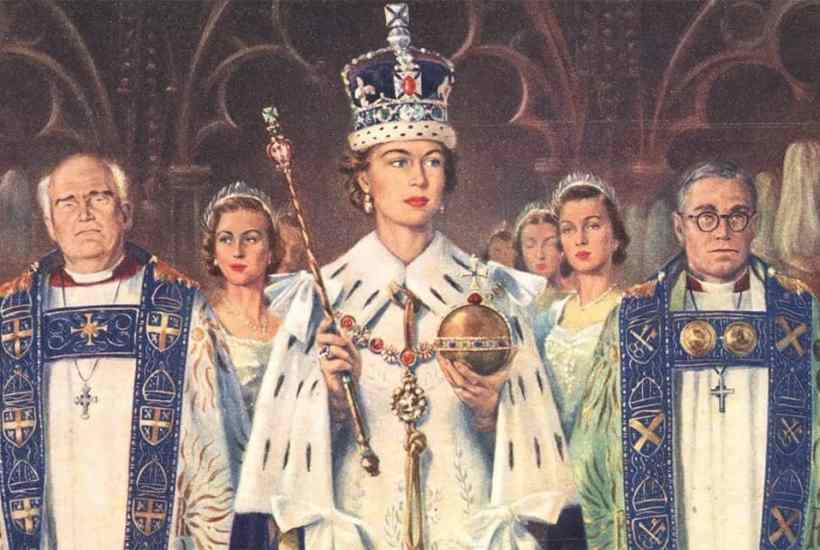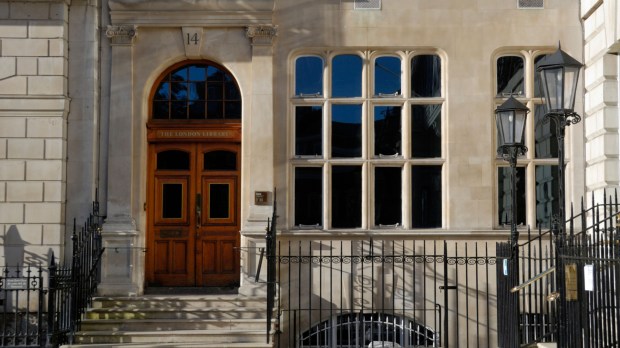If this were a Catholic country, up would go the cry for canonisation. When Pope John Paul II died, the crowds in St Peter’s Square shouted ‘Santo subito!’ And the Polish Pope was indeed made a saint with unusual speed. What about St Elizabeth, with Windsor as her Compostela? Well, we are not a Catholic country, and if we were, Elizabeth II would never have become our Queen. She clearly did, however, possess the first of the two formal qualifications for sainthood, what the Church calls ‘heroic virtue’. The second is to prove two miracles effected by intercession to the person concerned. This can take time, but the world is already full of people who believe the late Queen cured them of this or that. As her cult grows, plenty of posthumous examples will come forward. The Church of England, of which she was Supreme Governor, has an odd position on sainthood. It accepts pre-Reformation canonisations but has never tried to add to their number (with one important and controversial exception – King Charles the Martyr). If it were minded to do so, this is its best possible moment to start. Admittedly, the person in all the world least likely to have approved of such a proceeding would have been Elizabeth herself. But then, the sort of person who wants to be a saint is the sort who must not be made one.
I already know personally of one example where the Queen, after death, made a difference. My cousin, Tom Oliver, has long suffered from exceptional anxiety about catching illnesses. He worked hard, usually successfully, in managing this, and leads an active, fruitful life; but his worry was worsened by Covid, particularly because he is diabetic and because he was engaged in major commitments which would burden his wife if he died or was incapacitated. Until this week, Tom had had almost no direct human contact, except with immediate family, for more than 29 months. He decided, however, that he really should witness the lying-in-state. He travelled up from rural Herefordshire, and queued among the crowds of thousands, for 15 hours, never sitting down. He reached Westminster Hall well after night had fallen, and viewed the coffin. Behold, he tells me, the wonderful experience of grace cast out his fear. He is left with its rational aspects, but finds that what he calls ‘the sense of irrational jeopardy’ has gone. He quotes the line from the hymn, ‘The prisoner leaps to loose his chains’.
When the word ‘diversity’ is used, it is often a code word for people in a predominantly white society who have black or brown skin, but the definition should surely go wider. The most important example of this in the Queen’s funeral was the man who so beautifully organised its military aspects, Christopher Ghika, Major-General commanding the Household Division. He is a Romanian prince and the great-grandson of the legendary Princess Marthe Bibesco. He is a British citizen because George VI gave shelter to his grandfather during the war, allowing him to keep his princely title. Gen. Ghika does not use the title, but his gratitude to the King is expressed in this last service he performed for his elder daughter. His follows the classic pattern of so many immigration stories, if at an unusually rarefied level.
Much has been said about the late Queen’s love of dogs and horses, less about the more general fact that she was a countrywoman. Almost everyone is either a town mouse or a country one, and she was the latter. This was always a source of comfort to rural people all over the nation, particularly in an age when hardly any powerful people have a close connection with the land. Of the six British prime ministers who attended the Queen’s funeral, only one, David Cameron, would identify as a country mouse. The good news, however, is that the new King is equally a champion of rural life. Indeed, he supports it, from Truro to Transylvania, with an ardour which was foreign to his mother’s character. Country people could have no stronger or higher-placed friend at court.
I have been studying Sir Arthur Penn’s manuscript account of the death of George VI in 1952. The future Charles III, aged three, was at Sandringham with his parents once they had hurried back from Kenya, after hearing the news of her father’s demise. The bearer party of Guards for the coffin were staying at York House on the estate to rehearse. The Prince, wearing a ‘ruby-coloured velveteen’ outfit and a deerstalker, went, under Penn’s care, to see them. The ‘huge men’ gathered and stood before the tiny boy. At his request, they put on their bearskins, greatcoats and belts, and presented their rifles. Satisfied, ‘the inspecting officer withdrew with a low bow’. I wonder if, 70 years later, standing beside his mother’s bearer party, the new King remembered this first encounter with death and succession.
Penn was private secretary to the new Queen’s mother, Queen Elizabeth. When Elizabeth II and Prince Philip reached Sandringham, Penn ‘bowed over her hand and kissed it for the first time’, saying, ‘God bless Your Majesty always.’ ‘“Thank you, Arthur”, she said, in that clear voice which I have known so well since she could only lisp with it. I felt strangely moved.’ Penn added that ‘The Queen and even more, Prince Philip, are bursting with new ideas, as they should be.’ He made it a rule ‘to criticise nothing solely because it was new’. This would be a good rule to re-apply now, after almost three-quarters of a century.
Walking through Green Park earlier in the week, weaving my way through the bunches of flowers, I imagined myself as a visitor who had heard no news. Why, I might have asked myself, is everyone so upset about the death of a small bear with a red hat?
Got something to add? Join the discussion and comment below.
Get 10 issues for just $10
Subscribe to The Spectator Australia today for the next 10 magazine issues, plus full online access, for just $10.
You might disagree with half of it, but you’ll enjoy reading all of it. Try your first month for free, then just $2 a week for the remainder of your first year.















Comments
Don't miss out
Join the conversation with other Spectator Australia readers. Subscribe to leave a comment.
SUBSCRIBEAlready a subscriber? Log in